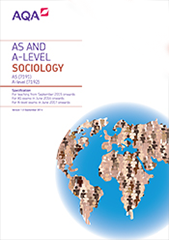4.2 Topics in Sociology
The study of these topics should engage students in theoretical debate while encouraging an active involvement with the research process.
The study should foster a critical awareness of contemporary social processes and change, and draw together the knowledge, understanding and skills learnt in different aspects of the course.
In their study of these topics, students should examine:
- topic areas in relation to the two core themes (socialisation, culture and identity; and social differentiation, power and stratification)
- both the evidence of and the sociological explanations for the content listed in the topic areas below.
Throughout, students should be encouraged to use examples drawn from their own experience of small-scale research.
Attention should be given to drawing out links with other topics studied in this specification.
Culture and Identity
Students are expected to be familiar with sociological explanations of the following content:
- different conceptions of culture, including subculture, mass culture, folk culture, high and low culture, popular culture and global culture
- the socialisation process and the role of the agencies of socialisation
- the self, identity and difference as both socially caused and socially constructed
- the relationship of identity to age, disability, ethnicity, gender, nationality, sexuality and social class in contemporary society
- the relationship of identity to production, consumption and globalisation.
Families and Households
Students are expected to be familiar with sociological explanations of the following content:
- the relationship of the family to the social structure and social change, with particular reference to the economy and to state policies
- changing patterns of marriage, cohabitation, separation, divorce, childbearing and the life course, including the sociology of personal life, and the diversity of contemporary family and household structures
- gender roles, domestic labour and power relationships within the family in contemporary society
- the nature of childhood, and changes in the status of children in the family and society
- demographic trends in the United Kingdom since 1900: birth rates, death rates, family size, life expectancy, ageing population, and migration and globalisation.
Health
Students are expected to be familiar with sociological explanations of the following content:
- the social construction of health, illness, disability and the body, and models of health and illness
- the unequal social distribution of health chances in the United Kingdom by social class, gender, ethnicity and region
- inequalities in the provision of, and access to, health care in contemporary society
- the nature and social distribution of mental illness
- the role of medicine, the health professions and the globalised health industry.
Work, Poverty and Welfare
Students are expected to be familiar with sociological explanations of the following content:
- the nature, existence and persistence of poverty in contemporary society
- the distribution of poverty, wealth and income between different social groups
- responses and solutions to poverty by the state and by private, voluntary and informal welfare providers in contemporary society
- organisation and control of the labour process, including the division of labour, the role of technology, skill and de-skilling
- the significance of work and worklessness for people's lives and life chances, including the effects of globalisation.
Beliefs in Society
Students are expected to be familiar with sociological explanations of the following content:
- ideology, science and religion, including both Christian and non-Christian religious traditions
- the relationship between social change and social stability, and religious beliefs, practices and organisations
- religious organisations, including cults, sects, denominations, churches and New Age movements, and their relationship to religious and spiritual belief and practice
- the relationship between different social groups and religious/spiritual organisations and movements, beliefs and practices
- the significance of religion and religiosity in the contemporary world, including the nature and extent of secularisation in a global context, and globalisation and the spread of religions.
Global Development
Students are expected to be familiar with sociological explanations of the following content:
- development, underdevelopment and global inequality
- globalisation and its influence on the cultural, political and economic relationships between societies
- the role of transnational corporations, non-governmental organisations and international agencies in local and global strategies for development
- development in relation to aid and trade, industrialisation, urbanisation, the environment, and war and conflict
- employment, education, health, demographic change and gender as aspects of development.
The Media
Students are expected to be familiar with sociological explanations of the following content:
- the new media and their significance for an understanding of the role of the media in contemporary society
- the relationship between ownership and control of the media
- the media, globalisation and popular culture
- the processes of selection and presentation of the content of the news
- media representations of age, social class, ethnicity, gender, sexuality and disability
- the relationship between the media, their content and presentation, and audiences.
Stratification and Differentiation
Students are expected to be familiar with sociological explanations of the following content:
- stratification and differentiation by social class, gender, ethnicity and age
- dimensions of inequality: class, status and power; differences in life-chances by social class, gender, ethnicity, age and disability
- the problems of defining and measuring social class; occupation, gender and social class
- changes in structures of inequality, including globalisation and the transnational capitalist class, and the implications of these changes
- the nature, extent and significance of patterns of social mobility.
